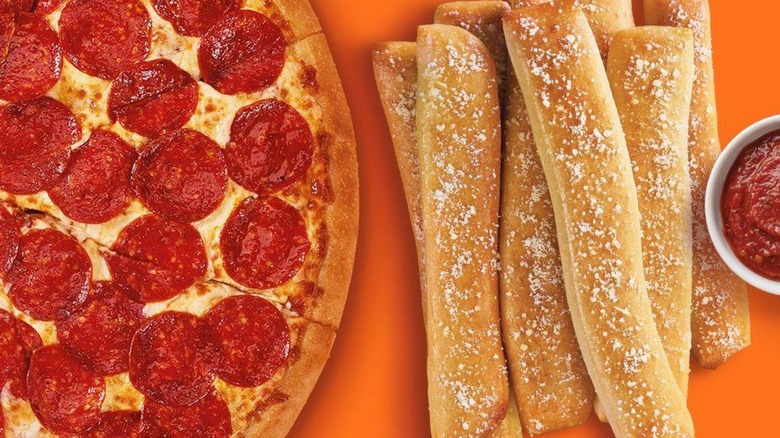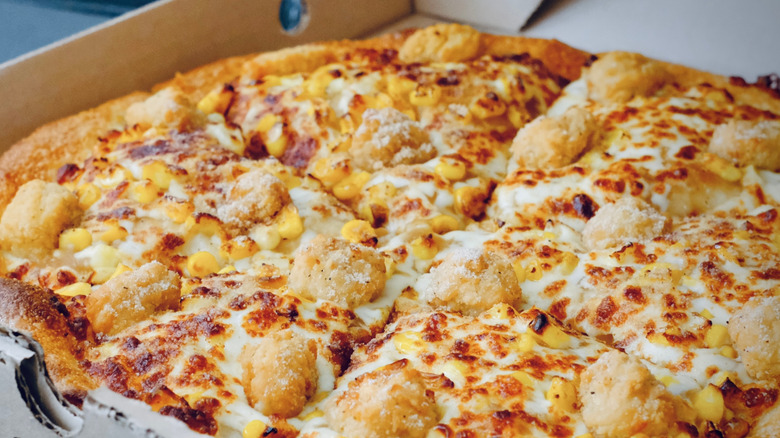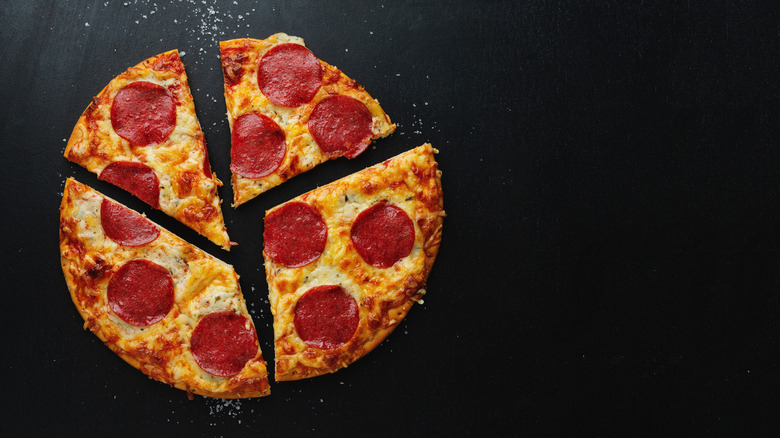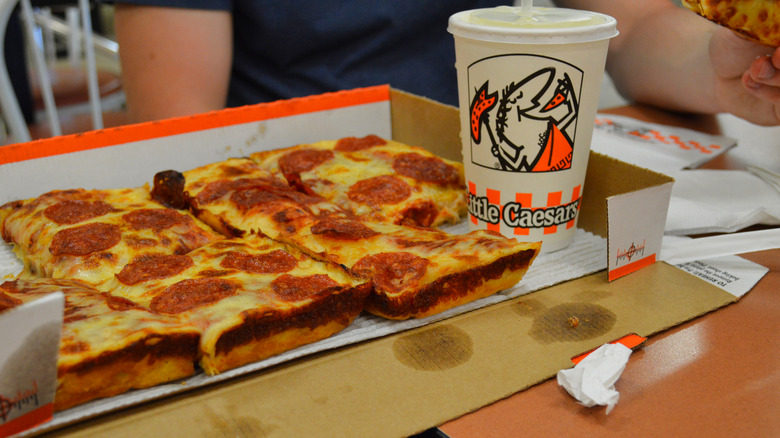The Reason Little Caesars Pizza Is So Cheap
Say what you want to about the quality of Little Caesars pizza, but you must admit that it's pretty hard to knock the chain for its prices. Little Caesars' $5 Hot-N-Ready deal has made the destination the go-to pizzeria for many customers prioritizing low-cost convenience. After all, a customer can walk in and walk out with a hot pizza in hand in less time than it takes to get through many fast food restaurants' drive-thru lines — and more cheaply, to boot.
So, how is it that Little Caesars is able to sell its pizza for such a low price? The obvious answer would be that the chain is using the cheapest ingredients possible. While this isn't entirely untrue, there's more that factors into the deal. As pizza expert and world- record-holding pizza box collector (yep, that's a title) Scott Wiener told Doctor Oz, the reason behind the low cost of Little Caesars pies is that in today's competitive pizza market, chains have to commit to either quality or cost and convenience. You can guess where Little Caesars went on that decision.
Cheap ingredients make for a cheap pizza
To save money on making its pies, Little Caesars does use cheaper ingredients. Its number-one cost-cutting trick is in the cheese, which makes up 40% of a pizza's cost, according to Bacino's Pizza. Pre-shredded, low-moisture cheese can be stored for a long time, which is why Little Caesars exclusively uses mozzarella cheese made from real cow's milk. The only time the mozzarella is supplemented is on the Hot-N-Ready pizzas, which also includes Muenster cheese.
Another major secret to keeping prices low comes in the form of the sauce and dough preparation. Little Caesars receives sauce concentrate in a bag, so the employees only need to add water to finish it. While this doesn't feel very homemade, an employee on Reddit did reveal that Little Caesars makes its own dough each day. Brand Eating confirmed this with a trip to the company's test kitchen to watch the dough being made with flour, water, sugar, salt, yeast, and soybean oil. By making the dough in-house, Little Caesars actually saves money because pre-made dough costs more. The dough and sauce also don't contain dairy or meat products, making them inherently cheaper to produce.
Little Caesars has its customers come to them
To make matters even more economical, Little Caesars is a takeout destination and therefore lacks the added overhead cost of maintaining an in-restaurant dining area. Plus, it doesn't run its own delivery system, offering delivery only through third-party services such as DoorDash, per CNBC. "While everyone else is chasing delivery, Little Caesars is letting the customer come to them," Darren Tristano of the food industry insights company Technomic told the outlet.
Bacino's Pizza reports that Little Caesars can actually make more money through this pickup model. Though its $5 pizzas are certainly cheap, the chain is able to lure customers into adding other items — such as wings and soft drinks — onto their orders since they are already inside the store. Plus, the pickup process means there is less work for paid employees to do: Customers pick up their food from a contactless Pizza Portal, which means workers do not have to spend time interacting with them or cleaning a heavily trafficked counter area. All of these factors combine to help the pizza company maintain low food prices.
The chain also saves on toppings
According to Bacino's Pizza, it only costs Little Caesars about $2 to make a cheese pizza, while a pepperoni pie can cost up to about $2.50 for the chain to produce, per a Little Caesars employee on Reddit. We already know that the chain intentionally buys money-saving mozzarella, but it also stretches its dollars further by using the cheese sparingly. You may have noticed that Little Caesars pizza is not as cheesy as the pies from other chains, and that's because the workers are instructed to sprinkle conservatively.
The same minimal toppings policy also extends to meats, such as pepperoni. Per Bacino's, the chain takes care to evenly spread pepperoni on each pizza, only using as much as is necessary to cover most of the pie. By closely controlling the quantity of toppings on each pizza, Little Caesars is able to save money on its consistently made product. TLDR: Little Caesars found a few simple but effective ways to lower its overhead costs, passing on the savings to customers on a final product that many people find to be affordable and reliable.



